-
-
FeaturesคุณสมบัติPenyelesaianRecursosFiturCaracterísticas精选功能功能特點المزايا
-
Solutionsโซลูชั่นPenyelesaianSoluçõesSolusiSoluciones解决方案解決方案الحلول
-
IntegrationsการผสานรวมIntegrasiIntegraçõesIntegrationsIntegraciones集成整合服務دمج مع تطبيقات أخرى
-
Affiliate/Partnersพันธมิตร/พันธมิตรทรัพยากรAfiliasi/Rakan KongsiAfiliados/ParceirosAfiliasi/MitraAfiliados/Partners联盟/合作伙伴聯盟/合作夥伴شريك
-
ResourcesจองการสาธิตSumberRecursosSumber dayaRecursosالموارد資源中心
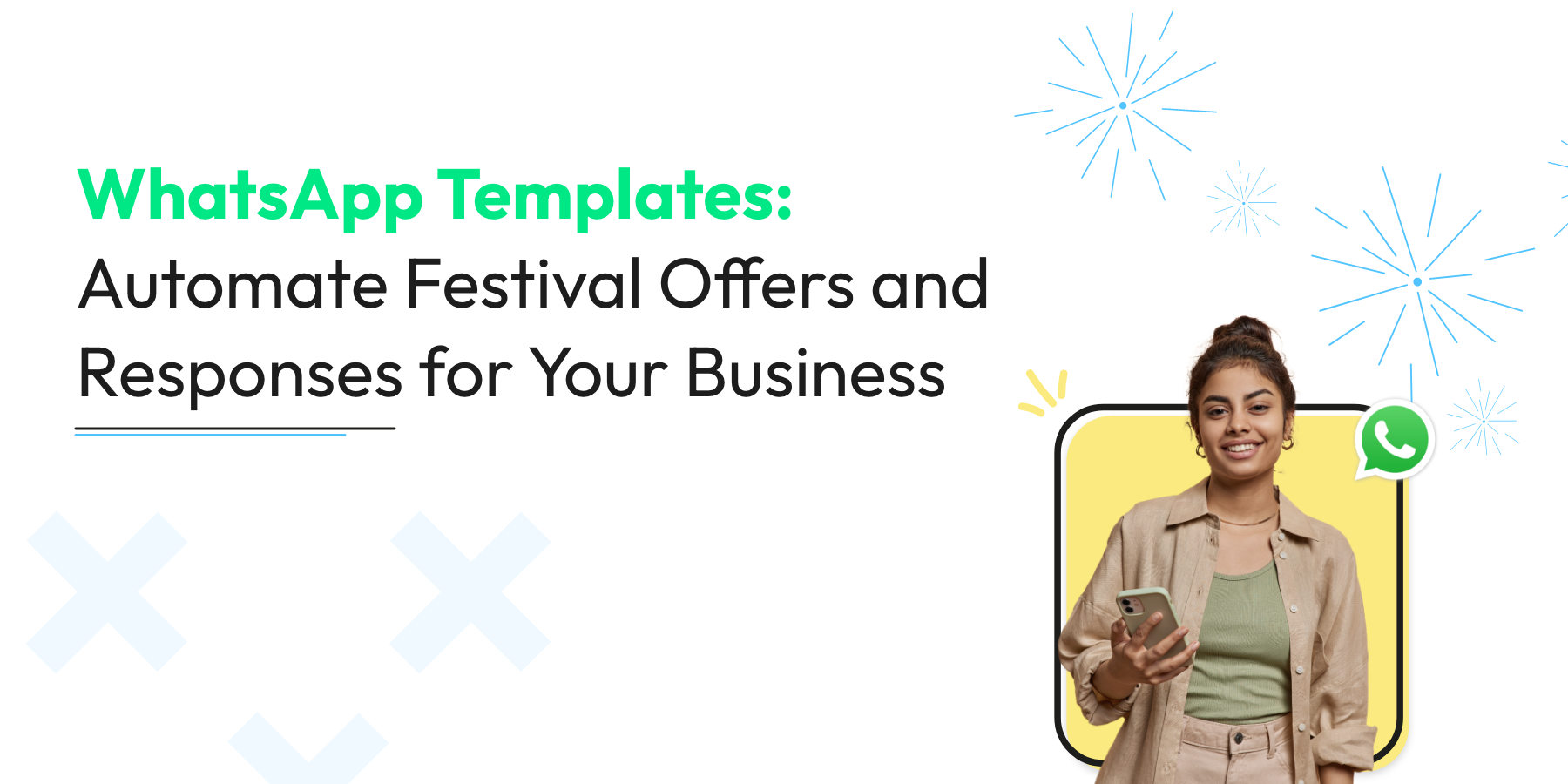
WhatsApp Templates: Automate Festival Offers and Responses for Your Business
In our modern world, keeping in touch with your customers is important for your business. WhatsApp is an excellent way for you to talk to your customers, and during festival seasons, it can be challenging for you to send out greetings and promotional offers to all customers.
But don’t worry; there’s a cool feature called WhatsApp Templates that can help you. In this article, we’ll explain WhatsApp Templates and how they can make it easier for your business to communicate with customers during festivals. This will make your customers happy, and it’ll also save you time and effort.
Also, we’ll share a few exciting Wati features that will help you stay ahead of your game during the festival season.
What are WhatsApp Templates?
WhatsApp Templates are like ready-made messages that business owners use to talk to their customers and potential customers on WhatsApp. These templates make it easy for you to send consistent and organized messages.
You can use them to welcome new customers, tell people about your latest products or deals, or remind customers about appointments. These templates have blanks you can fill in with specific details like names, orders, or dates.
But, before you can use these templates, WhatsApp must approve them. This ensures that businesses don’t send spammy or dishonest messages. Once WhatsApp gives the green light, you can use these templates to send messages to your customers. It makes it easier for you to give them quick and helpful information.
You can talk to your customers and potential customers professionally and reliably using WhatsApp Business Templates. This helps you build better relationships with them and saves you time.
Benefits of Using WhatsApp Templates

Here are the benefits of using WhatsApp Templates for you as a business owner, particularly during festival and shopping seasons:
Saves You Time: WhatsApp Templates help you respond to a lot of messages quickly, which is incredibly useful when many people are contacting you during busy times like festivals and shopping sprees.
Ensures Consistency: They ensure that your messages look consistent and professional every time you use them. This is essential when you have many messages to send, especially during major shopping events or festive seasons.
Adds a Personal Touch: Even though you’re using templates, you can still insert personal details like customer names or order information. This makes your customers feel special.
Enhances Communication: Templates make it easy to send greetings and updates to your customers. For instance, you can wish them a happy new year or inform them about special deals during festival seasons.
Quick Customer Support: If your customers have questions or issues, templates can help you provide quick answers. This is especially helpful when things get busy.
Boosts Sales: During shopping seasons, you can use templates to send messages about discounts, sales, and exciting products. This can encourage more people to make purchases from your business.
Efficient Order Management: You can utilize templates to confirm orders, provide delivery updates, and keep track of your inventory. This is crucial when many people are buying from you.
Reduces Errors: Templates help you avoid making mistakes when communicating with customers. This is particularly important when things are hectic.
Enhances Customer Satisfaction: By using templates to share valuable information with customers, you can keep them happy and interested in buying from you again.
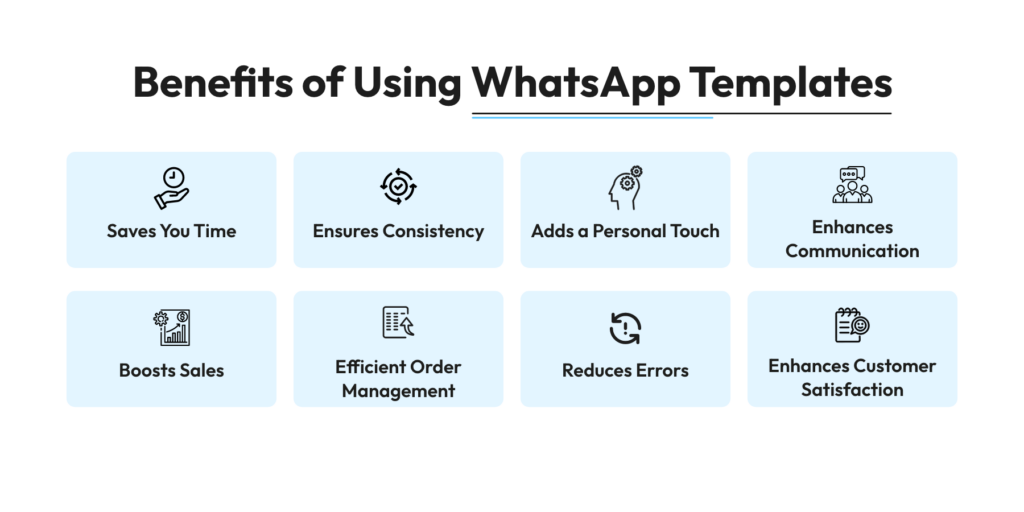
Also Read: Mastering the art of WhatsApp Template Messages
Step-by-Step Guide for Creating Festival Templates
Certainly, here’s a step-by-step guide for you, as a business owner, to create WhatsApp festival templates:
Step 1: Set Up a WhatsApp Business Account: If you haven’t already, make sure you have a WhatsApp Business account. Depending on your business needs, you can download the WhatsApp Business app or use the WhatsApp Business API.
Step 2: Identify the Festivals: Determine which festivals or special occasions you want to create templates for. Consider your target audience and the cultural significance of these events.
Step 3: Plan Your Messages: Decide what messages you want to send during these festivals. Common templates include greetings, special offers, event announcements, and thank-you messages
Step 4: Create Message Content: Write the content of your templates. Keep them concise, friendly, and relevant to the occasion. Include placeholders for dynamic information like customer names or order numbers.
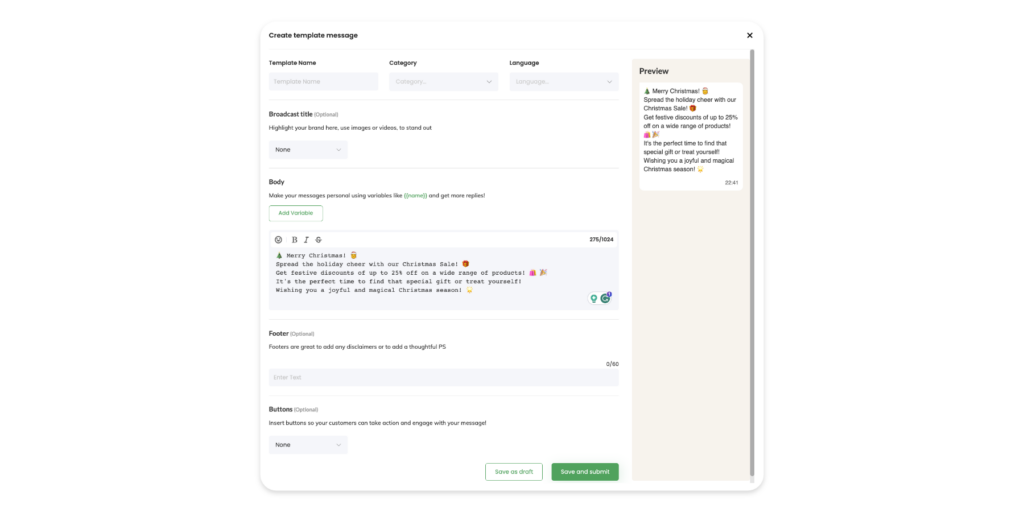
Step 5: Personalize Templates: If possible, personalize the templates with dynamic variables. For example, instead of saying “Hello There,” you can use a placeholder like “{{First Name}},” which the WhatsApp API will replace with the customer’s name.
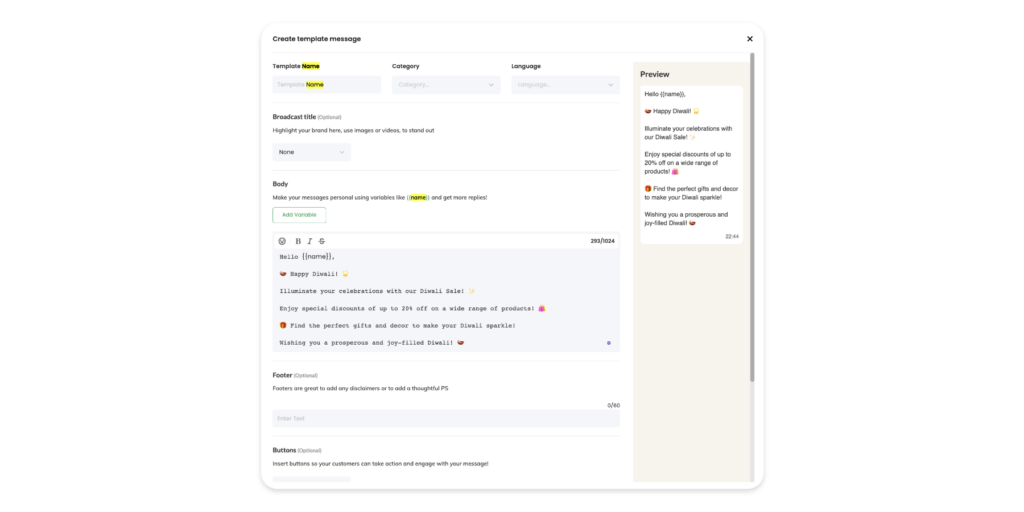
Step 6: Formatting: Ensure your templates are well-formatted and easily read on mobile devices. Use line breaks and emojis if they enhance the message.
Step 7: Template Submission: Submit your templates to WhatsApp for approval. They will review them to ensure they comply with WhatsApp’s guidelines and policies.
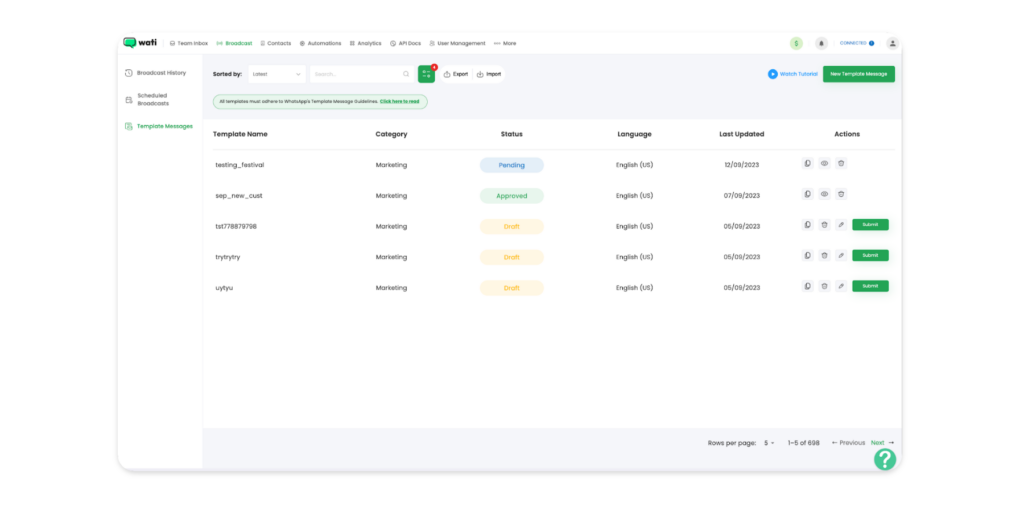
Step 8: Template Approval: Wait for WhatsApp to approve your templates. This may take some time, so plan ahead, especially for seasonal festivals.
Step 9: Sending Templates: Once your templates are approved, you can use them to message your customers during the respective festivals. You can do this manually or through automated systems integrated with the WhatsApp Business API.
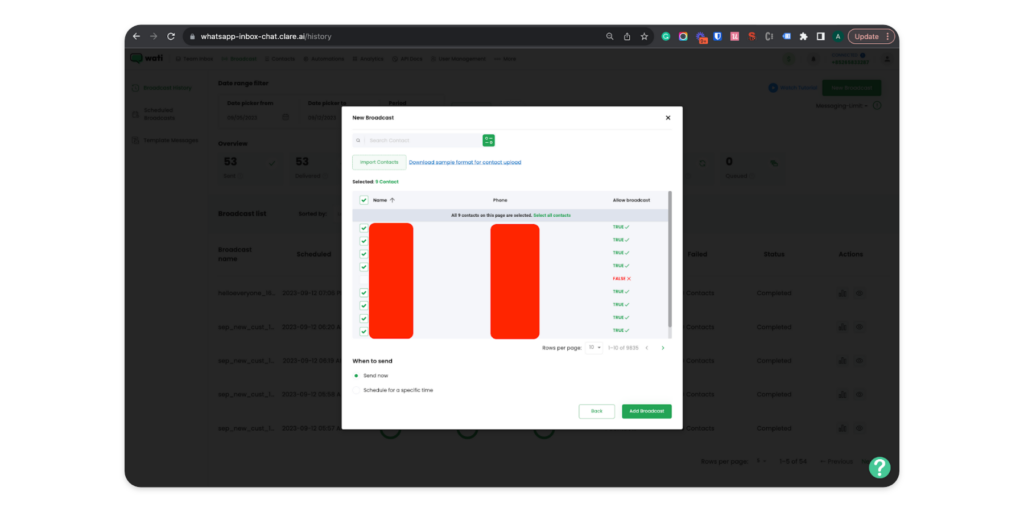
Step 10: Monitor and Adjust: Track the performance of your festival templates. Pay attention to open rates and customer feedback. Make adjustments to your templates based on what works best for your audience.
Remember to be respectful of your customer’s preferences and privacy. Don’t overuse templates or send unsolicited messages. WhatsApp is a valuable tool for customer engagement when used thoughtfully and respectfully.
Also Read: Our support article on how to create WhatsApp Templates
Importance of Maintaining Professional Tone with Festival Messages
Talking to your customers nicely and professionally is important, especially during festivals. Here’s why it matters and how to do it:
Good Reputation: Acting like a pro makes people trust your business. But being friendly during festivals shows you’re easy to talk to. Together, this makes your business look good.
Talking to Customers: Festive messages make customers feel special and happy. Being professional means customers feel respected, making them want to talk to you more.
Respecting Cultures: Festivals can mean different things to different people. Being professional means you respect what these festivals mean to others. You won’t say anything that could hurt someone’s feelings.
Clear Communication: Being professional means you say things clearly and easily. You can tell customers important stuff, like holiday hours or special deals, so they understand.
Keeping the Same Style: It’s important to keep your business’s style the same. Being professional with a friendly touch means your messages always feel like they come from your business, even during extraordinary times. This helps people recognise and trust your business.
Standing Out: Businesses that get the balance right between professionalism and friendliness often do better than others. Your messages seem more thoughtful and fun, which can help you get and keep customers.
Happy Customers: Customers like it when businesses remember special occasions. Being professional with a festive touch makes customers feel cared for, which makes them happy.
More Sales: Festive messages often have deals or promotions. When you’re professional, you tell customers about these offers in a way that makes them want to buy. This can boost your sales.
Keeping Customers: Festive messages with a professional tone can create strong connections with your customers. These connections make customers want to keep buying from you and staying loyal to your business.
Following Rules: Being professional ensures your festive messages follow the law and privacy rules. This means you won’t have problems with sending unwanted or inappropriate messages.
Examples of WhatsApp Templates for Different Festivals
New Year
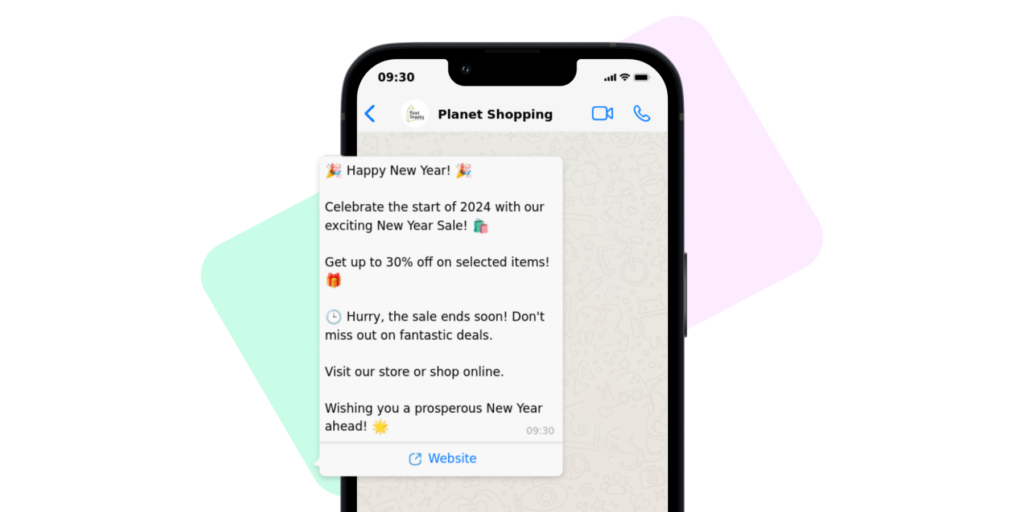
Christmas
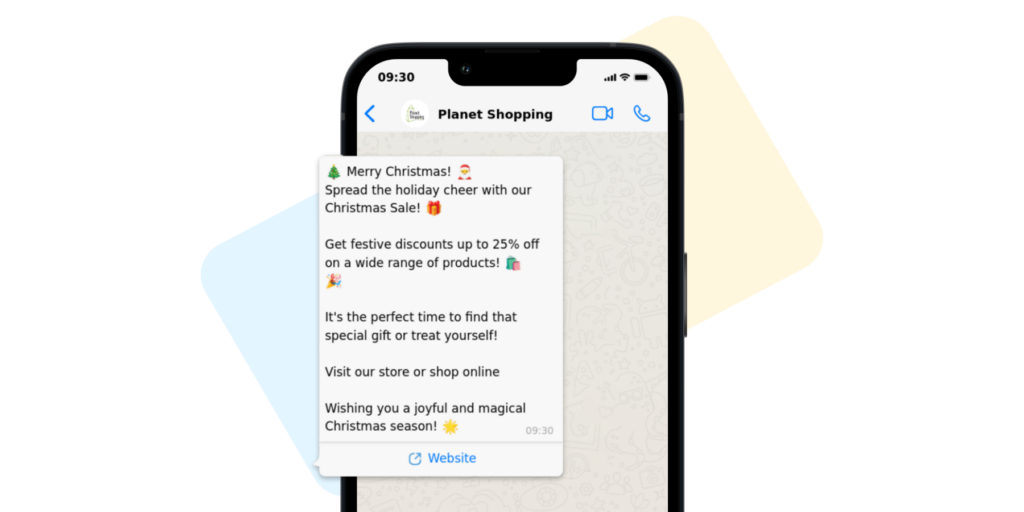
Diwali
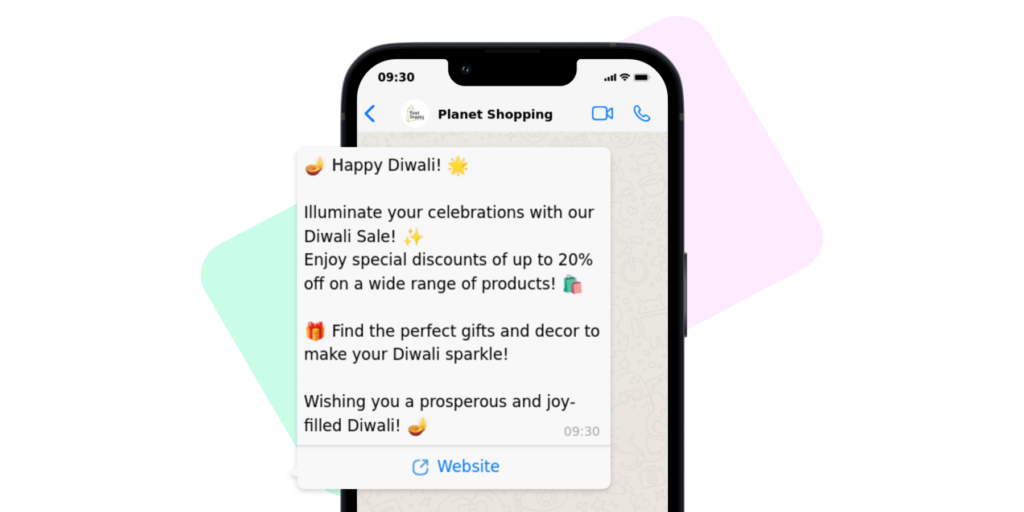
How WhatsApp Templates Can Be Used to Automate Festive Messages
Structured Messaging: WhatsApp templates allow you to create predefined message formats that maintain a consistent structure. This structure ensures that your festive greetings are well-organized and easy to understand.
Personalization: While templates provide a standardised format, they also allow for personalization. You can include placeholders for customer-specific information like names or order details. When you send the message, WhatsApp replaces these placeholders with the actual customer data, making the greeting feel more personal.
Efficiency: During festive seasons, businesses often receive an influx of messages and greetings. With templates, you can respond to these messages efficiently and promptly. You no longer need to craft individual responses for each customer, saving you valuable time and effort.
Consistency: Maintaining a consistent tone and style in your festive greetings is essential for brand identity. WhatsApp templates help you achieve this consistency, ensuring your brand is represented well in all your interactions, even during busy periods.
Timeliness: Festivals often have specific dates and times associated with them. WhatsApp templates enable you to schedule greetings in advance, ensuring they are sent out at the right moment to maximise their impact.
Automated Reminders: You can use templates to set up automated reminders for special events or offers related to the festival. For example, you can schedule a reminder about a limited-time festive discount to be sent out on the festival’s first day.
Enhanced Customer Engagement: Automated festive greetings show your customers you care about their celebrations. This engagement can increase customer satisfaction and a deeper connection with your brand.
Analytics and Insights: Some WhatsApp Business tools offer analytics to track the performance of your templates. You can measure open rates, click-through rates, and customer responses, allowing you to refine your messaging strategy for future festivals.
Compliance: WhatsApp templates comply with WhatsApp Business API policies, ensuring your automated greetings adhere to the platform’s rules and regulations. This prevents any issues related to spam or misuse.
Scaling Your Business: WhatsApp templates become even more valuable as your business grows. They enable you to maintain personalized communication with a more extensive customer base without significantly increasing your workload.

WhatsApp Templates Can Be Used to Respond to Common Customer Queries
WhatsApp templates are a powerful tool for businesses to streamline their customer support and respond efficiently to common customer queries. Here’s why they are essential for addressing frequently asked questions:
Consistency: WhatsApp templates ensure that responses to common queries remain consistent. This consistency is vital for providing accurate and reliable information to customers, regardless of who is handling the query.
Quick Response Times: With templates in place, you can respond to customer queries promptly. This is especially crucial for addressing urgent issues or time-sensitive inquiries.
Efficiency: Templates save valuable time for your customers and your support team. Agents can access pre-approved responses, reducing the need to type out the same answers repeatedly.
Reduced Human Error: Human errors can occur when dealing with repetitive queries. Templates minimize the risk of inaccuracies, ensuring that customers receive correct and reliable information.
24/7 Availability: WhatsApp templates can be used to create automated responses that are available 24/7. This means customers can get answers to their questions outside regular business hours.
Scalability: As your business grows, the volume of customer queries may increase. WhatsApp templates can be easily scaled to handle more inquiries without significantly expanding your support team.
Multi-Lingual Support: If your business serves customers from different regions or languages, templates can be translated and customized to provide support in multiple languages, improving accessibility.
Tracking and Analytics: Many WhatsApp Business solutions offer analytics tools that allow you to track the performance of your templates. You can monitor which responses are most effective and make improvements accordingly.
Personalization: While templates provide standardized responses, they can also include placeholders for personalization. This allows you to insert customer-specific information, such as names or order details, making the response more tailored.
Customer Self-Service: Templates can be used to guide customers through self-service options. For instance, you can provide step-by-step instructions for common tasks, reducing the need for customer-agent interactions.
Consolidated Information: Templates can include links or references to your knowledge base or FAQs, allowing customers to access additional information easily. This can help resolve their queries without further assistance.
Improved Customer Satisfaction: Quick, accurate, and reliable responses to common queries increase customer satisfaction. When customers feel their concerns are addressed efficiently, they are more likely to have a positive experience with your business.
WhatsApp templates are valuable for businesses aiming to provide efficient and consistent responses to common customer queries. They enhance the customer support experience, reduce response times, and contribute to overall customer satisfaction, benefiting your business’s reputation and customer relationships.
Examples of Template Responses
Inquiries
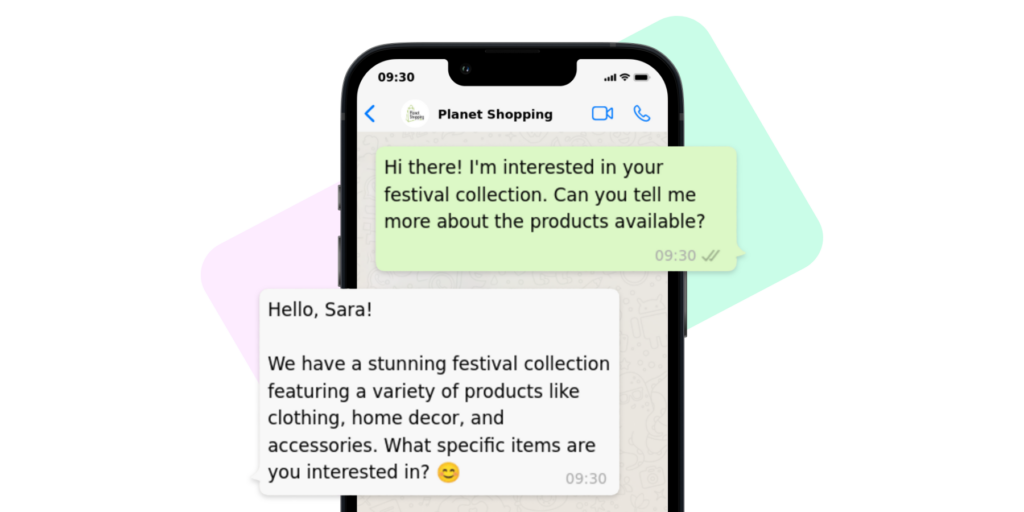
Discounts
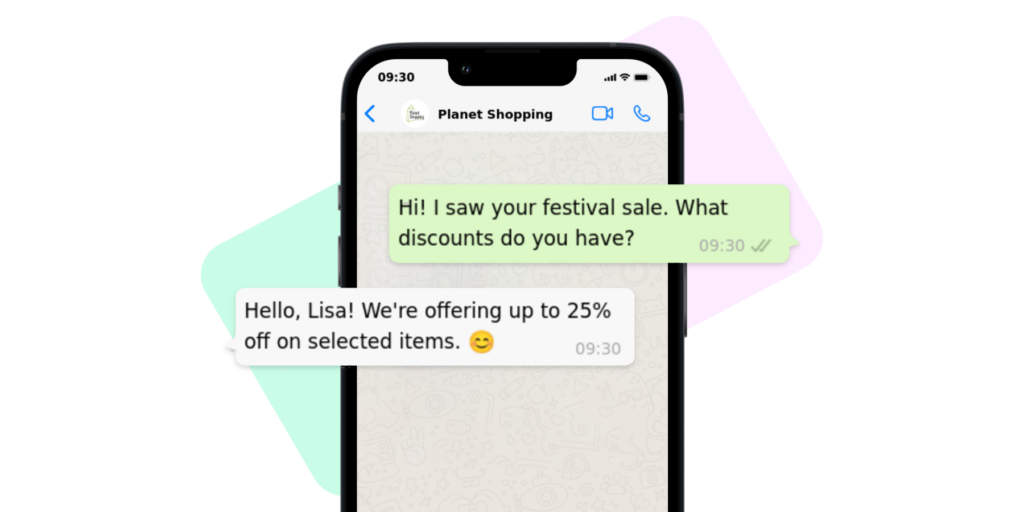
Product and Service Availability
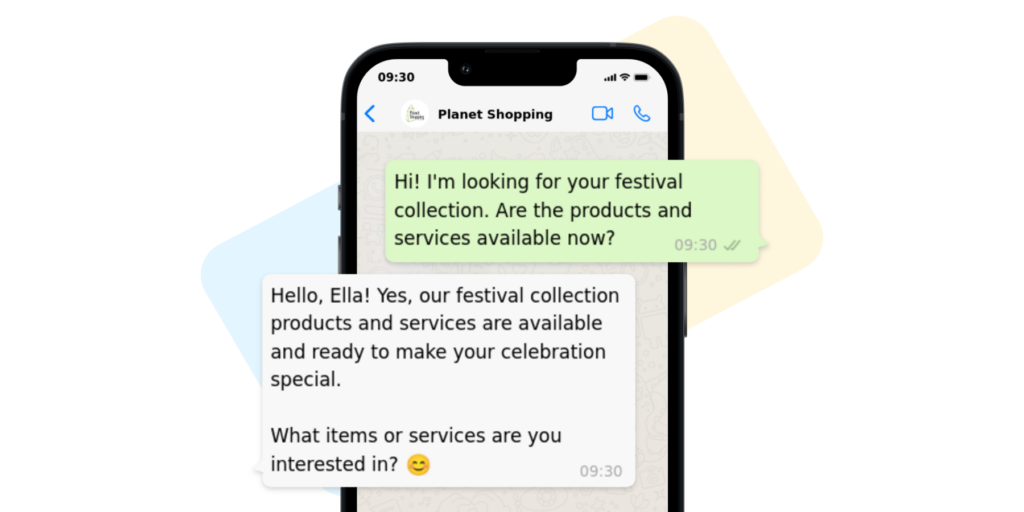
New product launch
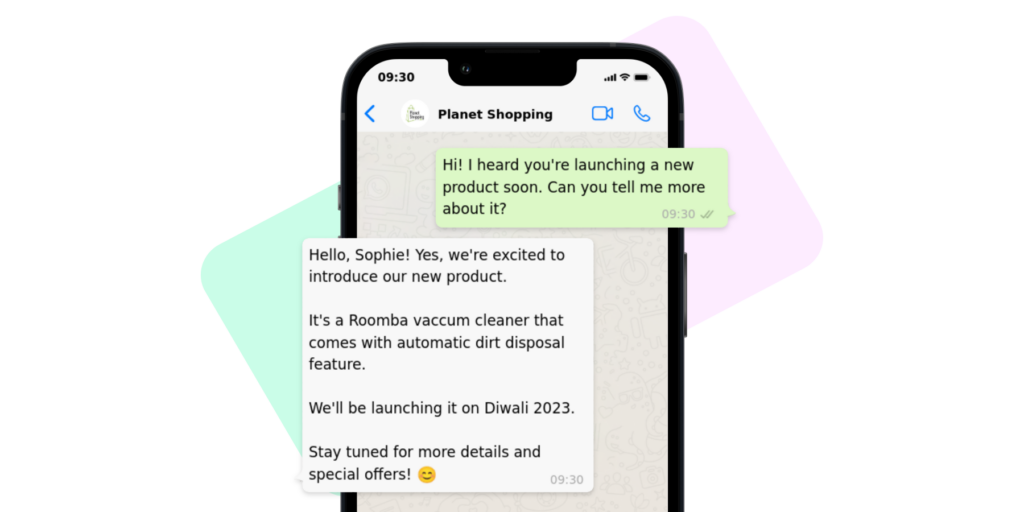
Use WhatsApp Templates to Provide Order updates to Customers
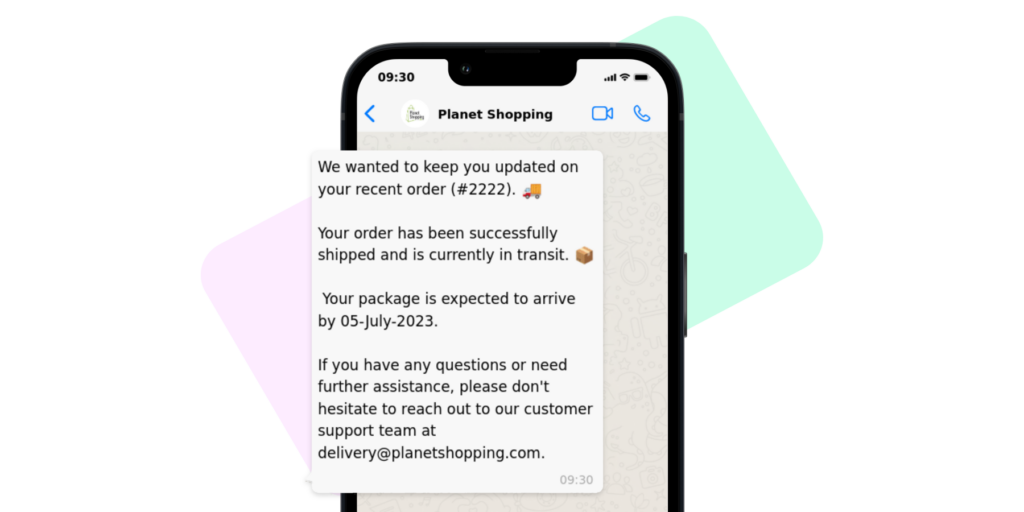
Benefits of Keeping Customers Informed About Their Orders During the Festive Season
Keeping customers informed about their orders during the festive rush offers numerous benefits for both businesses and their clientele. Here are some of the key advantages:
Enhanced Customer Experience: Providing regular updates during the festive rush demonstrates your commitment to customer satisfaction. It reassures customers that their orders are in progress, reducing anxiety and enhancing their overall shopping experience.
Reduced Customer Inquiries: When customers receive proactive order updates, they are less likely to reach out with inquiries about their deliveries. This reduces the burden on customer support teams and allows them to focus on more complex issues.
Improved Transparency: Transparent communication builds trust. Customers appreciate knowing the status of their orders, including expected delivery times. This transparency fosters a positive perception of your brand.
Mitigation of Potential Issues: If there are any delays or unexpected challenges with orders, keeping customers informed allows them to adjust their expectations. They are more likely to be understanding when they are aware of any issues in advance.
Opportunity for Upselling: Order update notifications provide an opportunity to suggest complementary products or services. For example, you can include recommendations for additional items that go well with the customer’s purchase, leading to potential upsells.
Customer Loyalty: Effective communication during the festive rush can strengthen customer loyalty. Customers who have a smooth and transparent shopping experience are more likely to return for future purchases.
Positive Reviews and Referrals: Satisfied customers are more inclined to leave positive reviews and refer your business to friends and family. This can substantially impact your brand’s reputation and customer acquisition.
Order Accuracy: By keeping customers informed, you also reduce the likelihood of order errors or misunderstandings. Clear communication ensures customers receive what they expect, reducing the need for returns or exchanges.
Competitive Advantage: Businesses that keep customers informed during busy periods stand out in the marketplace. Such practices can set you apart from competitors and attract more customers to your brand.
Customer Retention: During the festive rush, customers have numerous options for their purchases. Effective communication and order updates help retain customers who might otherwise turn to competitors.
WhatsApp’s Policies and Guidelines for Using Templates
WhatsApp has specific policies and guidelines to govern the use of templates on its platform. These policies are essential to ensure the responsible and lawful use of WhatsApp Business API templates for businesses engaging with customers. Here are some key aspects of WhatsApp’s policies and guidelines for using templates:
Template Messaging Approval: WhatsApp requires businesses to approve their template messages before using them. Templates should adhere to WhatsApp’s content and formatting guidelines to ensure quality and compliance.
Message Types: WhatsApp classifies messages into several message types, such as Session Messages and Template Messages. Businesses must use the appropriate message type for each communication to meet WhatsApp’s guidelines.
Opt-In Consent: Businesses must obtain opt-in consent from customers before sending them template messages. Customers should explicitly agree to receive messages from the business.
Message Content: Template messages must contain essential and relevant information. They should be concise and clear, avoiding excessive promotional content or spammy elements.
Personalisation: Templates should allow for personalisation, where placeholders include customer-specific information like names or order details. Personalisation enhances the relevance and authenticity of messages.
Message Rate Limitations: WhatsApp limits the number of template messages businesses can send within specific timeframes. This helps prevent abuse and spam.
Message Expiry: Template messages have an expiry period, typically 24 hours after a customer’s last response. Businesses cannot send template messages outside this window unless they fall under specific use cases like account updates.
Account Verification: Businesses that want to use WhatsApp’s green verification badge must adhere to WhatsApp’s stringent guidelines and verification procedures.
Prohibited Content: WhatsApp prohibits certain types of content, such as hate speech, harassment, illegal activities, or misleading information, in template messages.
Compliance with Regulations: Businesses must comply with applicable laws and regulations when using WhatsApp templates, including data protection and privacy laws.
Customer Support: WhatsApp expects businesses to provide adequate customer support and respond to inquiries and requests within a reasonable timeframe.
Monitoring and Enforcement: WhatsApp monitors the use of templates and enforces policies. Violations can result in warnings, restrictions, or WhatsApp Business API access suspension.
Data Protection: Businesses are responsible for protecting the privacy and data of their customers. WhatsApp provides guidelines on data handling and encryption.
Wati Feature For the Festival Season
Festival Ready Template Samples
If you’re in India, Sign up for a Wati account and head over to our templates page, where you can click on “new template message” and select “use a template” to give them a spin. The best part? We’ve made these templates available in draft status, making it incredibly easy for you to dive right in and start using them.
Frequently Asked Questions
Are WhatsApp templates only for larger businesses?
No, WhatsApp templates are available for businesses of all sizes. Whether a small startup or a more giant corporation, you can use WhatsApp templates to streamline customer communication.
Can I customise WhatsApp templates for my brand’s voice?
You can customise WhatsApp templates to align with your brand’s voice and style. This allows you to maintain consistency and convey your brand’s unique personality in customer interactions.
How do I ensure that my automated messages don’t feel impersonal?
To ensure your automated messages aren’t impersonal, focus on personalization, friendly language, and relevance. Use the recipient’s name or relevant information to make messages feel individualized, and adopt a conversational and approachable tone. Segment your audience to provide tailored content, and always offer value or solutions in your messages. Maintaining brand consistency and being ready to provide human support when customers need it is crucial, ensuring a seamless transition between automation and personalized interactions.
Can I use WhatsApp templates for promotional messages during festivals?
Yes, you can use WhatsApp templates for promotional messages during festivals. WhatsApp templates are a useful tool for businesses to send out festive offers, discounts, and greetings to customers in a structured and compliant manner. Just ensure your templates follow WhatsApp’s guidelines and offer value to your recipients.
Are there any limitations to using WhatsApp templates?
Certainly, there are limitations to using WhatsApp templates. These include the need for template approval, a 24-hour message window, content restrictions, rate limiting, and requirements for personalization. To send template messages outside of the 24-hour window, you must initiate a session with the customer, which necessitates their active response. Opt-in consent from customers is crucial, and there may be associated costs for using WhatsApp Business API. Additionally, WhatsApp Business API availability may vary by region, and businesses must handle customer data responsibly and in compliance with data protection laws. These limitations are in place to maintain responsible and lawful usage while ensuring a positive customer experience.
How can I monitor the effectiveness of my WhatsApp templates?
To effectively monitor the effectiveness of your WhatsApp templates, implement several key strategies. Begin by tracking essential message metrics like open rates, click-through rates, and response rates. Conversion tracking can provide insights into how many recipients take desired actions after receiving a message. Collect customer feedback through surveys and direct input to gauge user-friendliness and engagement. Employ A/B testing to compare different template versions, segment your audience for performance evaluation, and analyze the conversion funnel to identify bottlenecks. Additionally, monitor customer retention rates following template messages and seek feedback from your customer support team for valuable insights. Benchmark the performance of WhatsApp templates against other communication channels and calculate the ROI to accurately measure your messaging strategy’s impact. These approaches collectively offer a comprehensive view of your WhatsApp template effectiveness and enable data-driven improvements.
Latest Comments